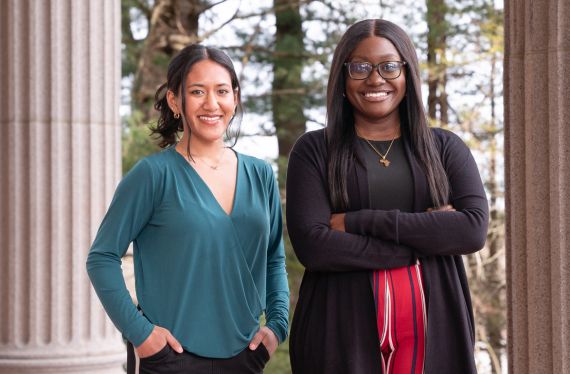While the global pandemic has upended study abroad experiences for college students around the world, it has not stopped some Regis College students from learning first-hand about other countries and cultures.
Students in two courses this semester are participating in the Collaborative Online International Learning (COIL) program, which connects classrooms from different countries to study a topic together and learn from each other.
“The co-learning experience was extremely new to me but I’ve gotten comfortable with it,” said Dimitri Stewart ’22. “It has really opened my eyes to how much people can still learn and communicate well even with the boundaries of culture and language.”
Stewart is taking Heather Josselyn-Cranson’s Global Music course, which is paired with a class at Benemérita Universidad Autónoma de Puebla in México for the first term of the semester. Students are exploring the significance of music in different cultures.
“Usually when I teach Global Music, the students have to physically put themselves in a place that is new to them where music is being used,” explained Josselyn-Cranson, the Sister Margaret William McCarthy Endowed Chair of Music. “Obviously, we can’t do that now but COIL still gives the students the chance to interact with people from a different culture and learn from insiders.”
Among the assignments the Global Music students completed this term with their peers in Mexico was examining recent chart topping songs from both countries and determining if they are good cultural representations. The song from the U.S. was “Watermelon Sugar” by Harry Styles, and from Mexico they studied “Vengo De Nada” by Ovi, Natanael Cano, Aleman, and Big Soto.
“It was very interesting to learn from the students in Mexico that the song really doesn’t represent how people there act when they go from having nothing to becoming rich,” said Erica Dessalines ’24, a global business management major.
Another course at Regis that will participate in COIL during the second term this fall is Exploring Humanities taught by Jennifer Potts. Teaming up with a course at Universidad Pontificia Comillas in Madrid, Spain, students will study the state of immigration in both countries.
Potts, an assistant professor of humanities, said she was very excited to participate in COIL and to get her students involved because it gives them a chance to see that they are part of a global community.
“We want the students to get a lot out of this experience and grow their cultural competencies,” Potts added. “We want this to impact the way they think about the world.”
A key aspect of COIL is the final project that students from both countries work together on. For Exploring Humanities, students will pick a medium, anything from a brochure to a children’s book to a podcast, to share and explain different viewpoints about immigration.
“We will assess the students’ cultural competencies before we start and when we finish and see how this kind of a project reframes the way they think,” said Potts.


